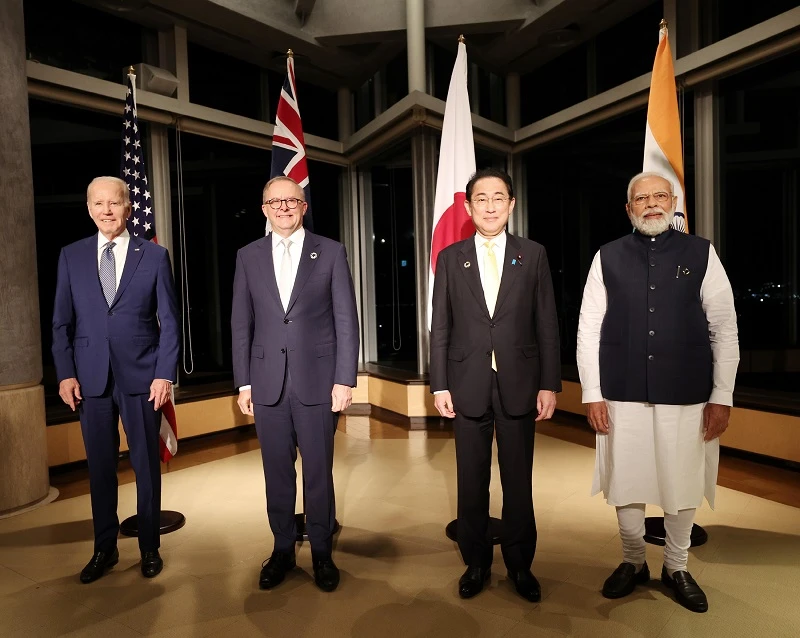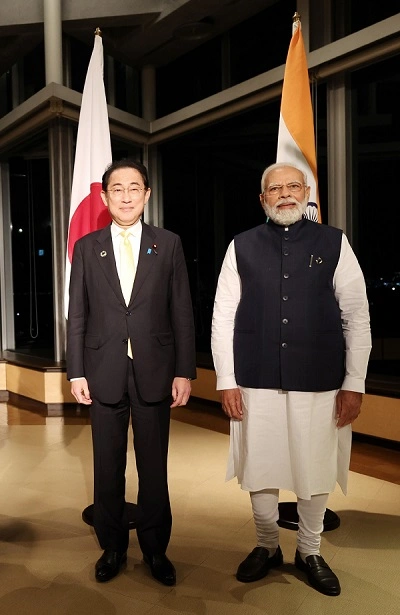Calling the Quad an important platform for peace, stability, and prosperity in the Indo-Pacific region, Prime Minister Narendra Modi on Saturday said that India will be pleased to host the 2024 Leaders’ Summit in 2024.
PM Modi made the announcement during his opening remarks at the third in-person Quad Leaders’ Summit in Japan’s Hiroshima on Saturday with US President Joe Biden, Japanese Prime Minister Fumio Kishida, and Australian PM Anthony Albanese also in attendance.
Making it clear that the security and success of the Indo-Pacific is important not just for the region but for the entire world, PM Modi said that the four-nation grouping is moving forward with a constructive agenda based on shared democratic values.
“Through our shared efforts, we are giving a practical dimension to our vision for a free, open, and inclusive Indo-Pacific. Climate action, disaster management, strategic technologies, reliable supply chains, health security, maritime security, counterterrorism are examples of areas in which our positive cooperation is increasing,” said PM Modi.

Emphasising that there is “no doubt at all” about the fact that the Indo-Pacific region is the engine for global trade, innovation, and development, PM Modi said that India believes that the Quad will continue to work for global good, for the welfare of mankind, and for peace and prosperity.
India is scheduled to host the G20 Leaders’ Summit in September this year and bringing the Quad Leaders’ Summit to India in 2024 ahead of the general elections would be another significant achievement of the government led by Prime Minister Narendra Modi.
Speaking at the Quad Leaders’ Meeting in Hiroshima. https://t.co/ZKTSzXOPM5
— Narendra Modi (@narendramodi) May 20, 2023
In Hiroshima on Saturday, the four leaders reiterated their condemnation of terrorist attacks – including the 26/11 attacks in Mumbai and Pathankot – and vowed to strengthen cooperation through Quad’s new Working Group on Counterterrorism announced during the Quad Foreign Ministers’ Meeting held in New Delhi this March.
In a veiled reference to Pakistan, the Quad leaders also “unequivocally condemned” terrorism and violent extremism in all its forms and manifestations, including cross-border terrorism, and promised to work with regional partners in a comprehensive and sustained manner to strengthen the capability to prevent, detect and respond to threats posed by terrorism and violent extremism.
“We are committed to working together to promote accountability for the perpetrators of such terrorist attacks. We reiterate our condemnation of terrorist attacks, including the 26/11 attacks in Mumbai and in Pathankot, and our commitment to pursuing designations, as appropriate, by the UN Security Council 1267 Sanctions Committee. We will strengthen our cooperation through the new Working Group on Counterterrorism,” stated the Quad Leaders’ Joint Statement.
#WATCH | …I think people will look at this Quad 20-30 years from now and say that change is dynamic not only in the region but the world. In my view, we have made enormous progress in the last two years: US President Joe Biden during the #QUAD meeting in Hiroshima pic.twitter.com/DrwwPwoQal
— ANI (@ANI) May 20, 2023
Regarding the Ukraine crisis, the statement did not make any direct reference to Russia. It incorporated Prime Minister Narendra Modi’s earlier formulation made in the context of the Ukraine war that “ours must not be an era of war…”, and that the Quad remains “committed to dialogue and diplomacy”.
It also pointed to the centrality of the Indian Ocean Rim Initiative (IORI), implying recognition of India’s leadership in the Indian Ocean Region (IOR).
Our shared vision for an open, stable and prosperous Indo-Pacific will help us build a better future for our people and the region.
I look forward to strengthening our partnership. pic.twitter.com/WZyNfBvT8F
— Anthony Albanese (@AlboMP) May 20, 2023
Without naming China, the Quad declared that it remains fully resolved to uphold peace and stability in the Indo-Pacific maritime domain and strongly oppose destabilising or unilateral actions that seek to change the status quo by force or coercion.
“We emphasise the importance of adherence to international law, particularly as reflected in the United Nations Convention on the Law of the Sea (UNCLOS), and the maintenance of freedom of navigation and overflight, in addressing challenges to the maritime rules-based order, including those in the East and South China Seas.
“We express serious concern at the militarisation of disputed features, the dangerous use of coastguard and maritime militia vessels, and efforts to disrupt other countries’ offshore resource exploitation activities,” the Joint Statement added.




















